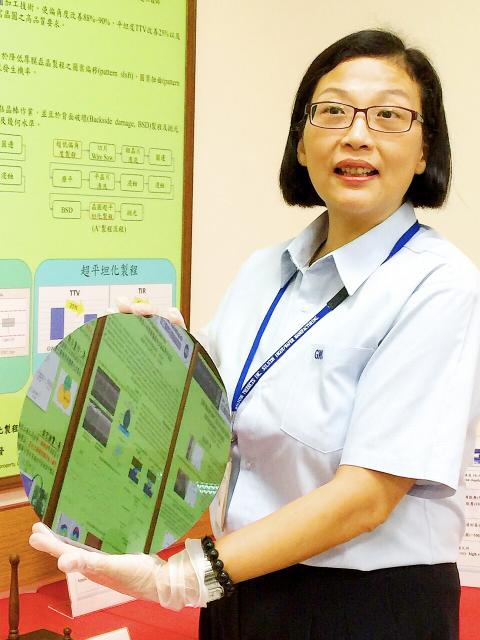GlobalWafers Co (環球晶圓) shares tumbled 9.51 percent yesterday as bigger rival SUMCO Corp’s newly unveiled capacity expansion plan gave jitters to cautious investors.
GlobalWafers, the world’s No. 3 semiconductor silicon wafer supplier, saw its shares take a nosedive to NT$242.5 yesterday, eclipsing the company’s strong financial performance in the first half this year.
SUMCO on Monday said that it planned to invest ¥43.6 billion (US$396 million) on building a new 12-inch wafer fab in Japan to help mitigate supply constraints.

Photo: Hung Yu-fang, Taipei Times
The Japanese company expects the new fab to start operation in the first half of 2019, which should help SUMCO add 110,000 12-inch silicon wafers a month to its existing capacity, according to a company statement posted on its Web site.
“We expect the impact will not be significant as the industry is entering its ‘supercycle,’” GlobalWafers vice president Lee Chung-wei (李崇偉) said by telephone.
“Investors have overreacted [to SUMCO’s expansion plan],” he said.
The capacity increase from SUMCO accounts for merely 2 percent of market demand for 5.5 million 12-inch wafers per month, Lee said.
“At present, market demand greatly exceeds supply, which we have not seen in more than a decade. Our capacity is fully booked even for next year,” Lee said.
SUMCO’s announcement also weighed on shares of GlobalWafers’ local peers Formosa SUMCO Technology Corp (台塑勝高科技) and Wafers Corp (合晶科技), which saw their stock prices plunge 3.16 percent and 4.21 percent to NT$92 and NT$20.5 respectively.
GlobalWafers expects the supply crunch to extend into the next two years due to limited new supply, shrugging off concerns over a potential supply glut due to SUMCO’s new fab.
The world’s major chipmakers, including Taiwan Semiconductor Manufacturing Co (台積電) and Samsung Electronics Co, have announced large-scale capacity expansion plans, as market demand is to increase by 1 million wafers a month by 2019, outgrowing supply, Lee said.
In spite of strong customer demand, GlobalWafers said it is in no rush to build any new plant as its priority is to integrate its resources and capacity with SunEdison Semiconductor Ltd, a US-based silicon wafer maker acquired by GlobalWafers last year.
“Many new 12-inch [finished wafer] production lines will ramp up in the next two to three years worldwide, especially in China, and this kind of booming market will definitely make the [raw] wafer supply much tighter,” GlobalWafers said in a statement on Monday.
Strong demand has helped drive the company’s net profit in the first half. Net profit soared 1.21 times to NT$1.64 billion (US$54.3 million) in the first two quarters this year, in comparison with NT$740 million in the same period last year, according to the company’s financial statement.
That translated into earnings per share of NT$4.17, up from NT$2 last year.

SELL-OFF: Investors expect tariff-driven volatility as the local boarse reopens today, while analysts say government support and solid fundamentals would steady sentiment Local investors are bracing for a sharp market downturn today as the nation’s financial markets resume trading following a two-day closure for national holidays before the weekend, with sentiment rattled by US President Donald Trump’s sweeping tariff announcement. Trump’s unveiling of new “reciprocal tariffs” on Wednesday triggered a sell-off in global markets, with the FTSE Taiwan Index Futures — a benchmark for Taiwanese equities traded in Singapore — tumbling 9.2 percent over the past two sessions. Meanwhile, the American depositary receipts (ADRs) of Taiwan Semiconductor Manufacturing Co (TSMC, 台積電), the most heavily weighted stock on the TAIEX, plunged 13.8 percent in

A wave of stop-loss selling and panic selling hit Taiwan's stock market at its opening today, with the weighted index plunging 2,086 points — a drop of more than 9.7 percent — marking the largest intraday point and percentage loss on record. The index bottomed out at 19,212.02, while futures were locked limit-down, with more than 1,000 stocks hitting their daily drop limit. Three heavyweight stocks — Taiwan Semiconductor Manufacturing Co (TSMC, 台積電), Hon Hai Precision Industry Co (Foxconn, 鴻海精密) and MediaTek (聯發科) — hit their limit-down prices as soon as the market opened, falling to NT$848 (US$25.54), NT$138.5 and NT$1,295 respectively. TSMC's

TARIFFS: The global ‘panic atmosphere remains strong,’ and foreign investors have continued to sell their holdings since the start of the year, the Ministry of Finance said The government yesterday authorized the activation of its NT$500 billion (US$15.15 billion) National Stabilization Fund (NSF) to prop up the local stock market after two days of sharp falls in reaction to US President Donald Trump’s new import tariffs. The Ministry of Finance said in a statement after the market close that the steering committee of the fund had been given the go-ahead to intervene in the market to bolster Taiwanese shares in a time of crisis. The fund has been authorized to use its assets “to carry out market stabilization tasks as appropriate to maintain the stability of Taiwan’s

In a small town in Paraguay, a showdown is brewing between traditional producers of yerba mate, a bitter herbal tea popular across South America, and miners of a shinier treasure: gold. A rush for the precious metal is pitting mate growers and indigenous groups against the expanding operations of small-scale miners who, until recently, were their neighbors, not nemeses. “They [the miners] have destroyed everything... The canals, springs, swamps,” said Vidal Britez, president of the Yerba Mate Producers’ Association of the town of Paso Yobai, about 210km east of capital Asuncion. “You can see the pollution from the dead fish.